Chromosomal Study on Selected Small Araneomorph Spiders from Brazil, Including the First Records in Palpimanidae and Theridiosomatidae (Araneae, Araneomorphae).
IF 1.4
3区 生物学
Q2 ZOOLOGY
引用次数: 0
Abstract
Among the 50,474 spider species, only 849 have chromosomal data available in the literature. Fifty spider families remain unknown from a cytogenetic perspective. The aim of this study was to analyze chromosomally selected araneomorph spiders from Brazil, to contribute to the cytotaxonomy and chromosome evolution of this group. The karyotypes of 12 species belonging to families Corinnidae, Linyphiidae, Oonopidae, Palpimanidae, Theridiidae, Theridiosomatidae, Trachelidae, and Zodariidae were analyzed, including the first chromosomal record for the first two families. Specimens (with the abdomen content partially exposed by perforation) were subjected to colchicine, hypotonization, and fixation. In most cases, the total content of the abdomen was used to prepare slides by spreading of cell suspension and subsequent Giemsa staining. The results were as follows: Cinetomorpha simplex Simon, 1892 (Oonopidae) 2n♂ = 9, X0; Neotrops sp. and Neoxyphinus termitophilus (Oonopidae), 2n♂ = 7, X0; Otiothops birabeni (Palpimanidae); Agyneta sp. (Linyphiidae), 2n♂ = 24, X1X20; Coleosoma floridanum, Thymoites sp.1 and Thymoites sp.2 (Theridiidae), 2n♂ = 22, X1X20; Naatlo sp. (Theridiosomatidae), 2n♂ = 30, X1X20; Orthobula sp. (Trachelidae) 2n♂ = 21, X0; Falconina sp. (Corinnidae), 2n♂ = 28, X1X20; Epicratinus sp. (Zodariidae) 2n♂ = 42, X1X20. The chromosomal morphology was determined for all the samples except for Oonopidae. Most species exhibited telocentric chromosomes, with the exception of Palpimanidae and Theridiosomatidae. The main findings: 1) support an hypothesis on ancestral karyotype of Zodariidae and Oonopidae; 2) reveal a relatively high chromosome number in Palpimanidae that supports an idea on relatively high ancestral chromosome number (2n♂ = 42) of entelegyne spiders (Palpimanoidea is sister group of entelegyne spiders); 3) show that the karyotype found in Theridiosomatidae is exceptional within the Araneoidea.巴西小型Araneomorphae蜘蛛的染色体研究,包括在蛛形目和蛛形目(Araneae,Araneomophrae)中的首次记录。
在50474种蜘蛛中,只有849种具有文献中可用的染色体数据。从细胞遗传学的角度来看,50个蜘蛛家族仍然未知。本研究的目的是分析从巴西筛选的染色体无定形蜘蛛,为该类群的细胞分类学和染色体进化做出贡献。分析了科里科、林蛙科、蛙科、皮蛛科、锥蛛科、鞘蛛科、管蛛科和钻蛛科12个种的核型,包括前两个科的第一个染色体记录。对标本(腹部内容物因穿孔而部分暴露)进行秋水仙碱、低电离和固定。在大多数情况下,通过细胞悬浮液的铺展和随后的Giemsa染色,使用腹部的总内容物来制备载玻片。结果表明:西蒙单形电影虫(Cinetomorpha simplex Simon,1892)2n♂ = 9,X0;Neotrops sp.和Neoxyphinus termitophilus(卵科),2n♂ = 7,X0;比氏Otiothoops birabeni(皮蛛科);Agyneta sp.(林蛙科),2n♂ = 24,X1X20;花鞘体,胸腺1和胸腺2(Therididae),2n♂ = 22,X1X20;Naatlo sp.(Theridiosomatidae),2n♂ = 30,X1X20;Orthobula sp.(Trachelidae)2n♂ = 21,X0;Falconina sp.(Corinnidae),2n♂ = 28,X1X20;Epiratinus sp.(Zodaridae)2n♂ = 42,X1X20。对除卵科外的所有样品进行了染色体形态测定。大多数物种都表现出末端中心染色体,但皮蛛科和Theridiosomatidae除外。主要研究结果如下:1)支持了蛙科和卵科祖先核型的假说;2) 揭示了Palpimanidae中相对较高的染色体数量,这支持了相对较高的祖先染色体数量(2n♂ = 42)(Palpimanoidea是恩氏蛛的姐妹群);3) 表明在Theridiosomatidae中发现的核型在Araneidea中是特殊的。
本文章由计算机程序翻译,如有差异,请以英文原文为准。
求助全文
约1分钟内获得全文
求助全文
来源期刊

Zoological Studies
生物-动物学
CiteScore
2.80
自引率
6.20%
发文量
35
审稿时长
6-12 weeks
期刊介绍:
Zoological Studies publishes original research papers in five major fields: Animal Behavior, Comparative Physiology, Evolution, Ecology, and Systematics and Biogeography. Manuscripts are welcome from around the world and must be written in English. When the manuscript concerns the use of animals or specimens in research, a statement must be included to the effect that the author(s) has adhered to the legal requirements of the country in which the work was carried out or to any institutional guidelines.
 求助内容:
求助内容: 应助结果提醒方式:
应助结果提醒方式:


